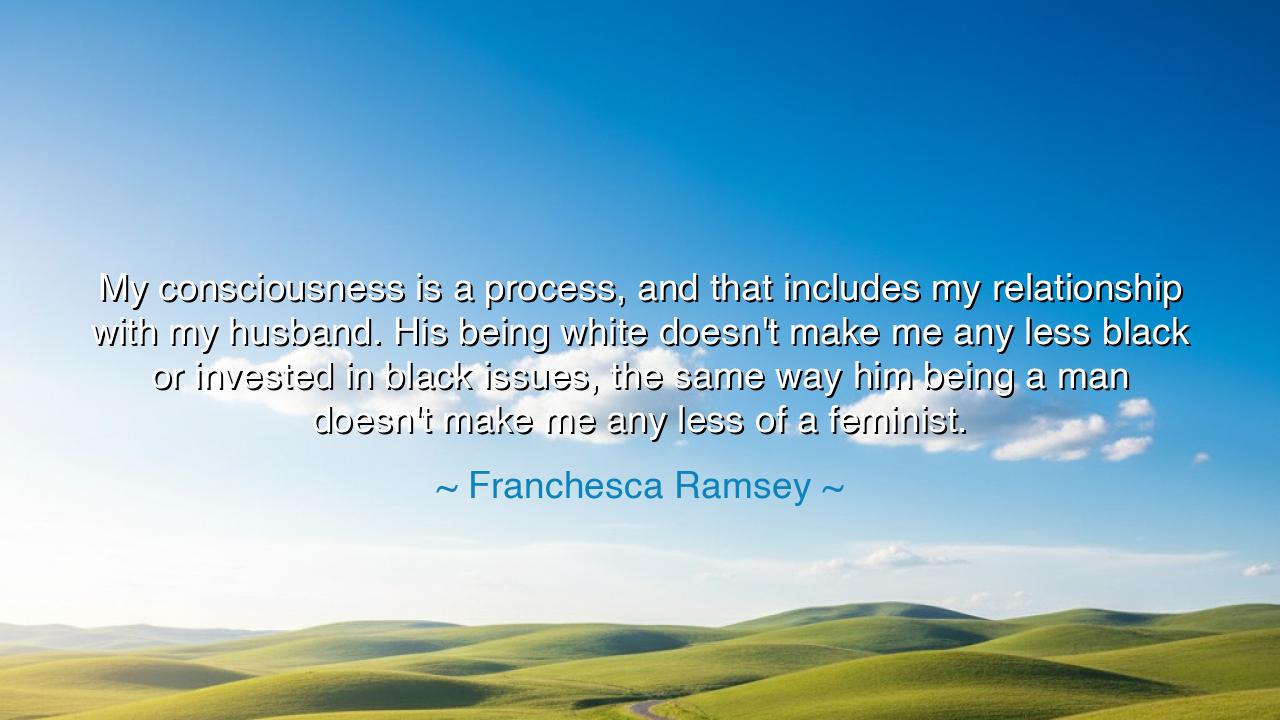
My consciousness is a process, and that includes my relationship
My consciousness is a process, and that includes my relationship with my husband. His being white doesn't make me any less black or invested in black issues, the same way him being a man doesn't make me any less of a feminist.






When Franchesca Ramsey declares, “My consciousness is a process, and that includes my relationship with my husband. His being white doesn’t make me any less black or invested in black issues, the same way him being a man doesn’t make me any less of a feminist,” she speaks as one who has wrestled with identity, love, and the gaze of the world. Her words carry the weight of ancient wisdom: that the essence of the self is not diminished by the bonds it forms, but strengthened, tested, and revealed through them.
The origin of this truth lies in the struggles of identity and justice, where people often face judgment not only for who they are, but for whom they love. Ramsey, standing in both personal and collective histories, rejects the notion that a relationship can undo the truth of her being. She reminds us that love does not erase identity; it does not dissolve the fight for justice or the pursuit of equality. Rather, it coexists with them, a part of the living process of consciousness.
To name consciousness a process is to admit that it is never finished. One’s awareness of self, of community, of struggle and purpose, evolves through time, experience, and connection. Her union with her husband, different in race and in gendered perspective, becomes not a dilution but a crucible, where understanding is sharpened and commitment to justice deepened. The black identity and the feminist spirit remain intact, unweakened by love, for they are truths that cannot be erased by difference.
Her words carry also the wisdom that false dichotomies enslave the mind. To claim that a woman loses her feminism by loving a man, or that a black woman loses her commitment to her people by loving a white man, is to misunderstand the nature of conviction. True belief, true identity, true justice — these are not fragile flames easily extinguished, but fires that burn through all circumstance.
Let the generations to come remember: the self is vast, a tapestry woven of love, struggle, and principle. A relationship does not lessen the threads of identity but may add new colors to its weaving. Ramsey’s words endure as a beacon, teaching that to live with integrity is to hold fast to one’s truths, even as one opens the heart to love across difference.






CDGiang Co don
I love how Ramsey addresses the idea that one part of our identity—like race or gender—doesn’t cancel out others, even in intimate relationships. It makes me think about how society tends to force people to fit into boxes, but we are so much more than a singular label. How often do we let societal expectations of race or gender define how we feel about ourselves or our relationships? How can we break free from that?
ALAnh Lan
Ramsey’s words remind me that identities are complex and fluid. She makes an important point about how relationships don’t have to negate or change who we are or what we stand for. But does this apply in all relationships? Can we truly maintain our stance on social issues without being influenced by our partners, or is it inevitable that our perspectives evolve together as we grow and learn from each other?
YNHoang Yen Nhi
I find it refreshing that Ramsey acknowledges both her identity as a black woman and a feminist without allowing her relationship to diminish either of those aspects. But how often do relationships challenge or redefine our views? Can love between two people of different races or genders coexist with our activism, or does it force us to confront issues of power, privilege, and identity in ways we might not have considered?
TNvu thao ngoc
Ramsey’s quote brings up an important issue of intersectionality. Her emphasis on not letting her husband’s identity influence her own political stance or sense of self is a reminder that our individual consciousness is a process. But I wonder, do we often struggle with balancing our personal identities with those of the people we love? Is it possible to maintain such a strong sense of self while also being influenced by the identities of our loved ones?
TTrang
I really resonate with Ramsey’s message about consciousness being a process. It’s easy to view people through narrow lenses—like race or gender—yet those labels don’t encompass all that someone is. But does this mean that our relationships, especially with those who have different experiences from us, can help us evolve into fuller, more aware versions of ourselves? How does being in a diverse relationship shape our own consciousness and identity?